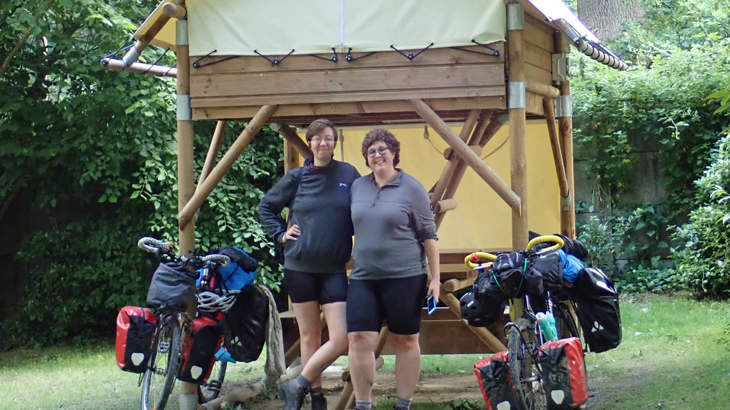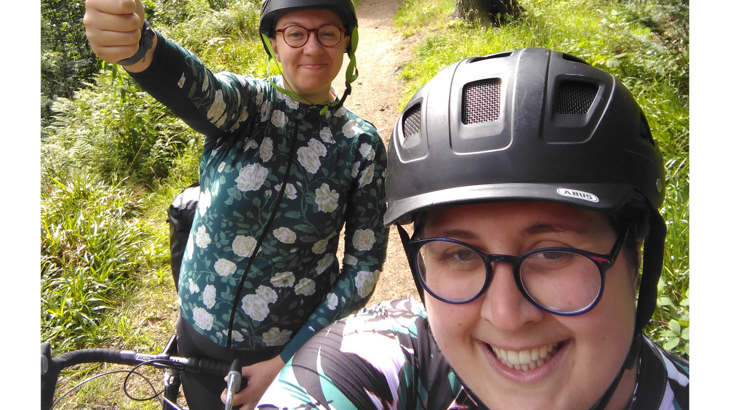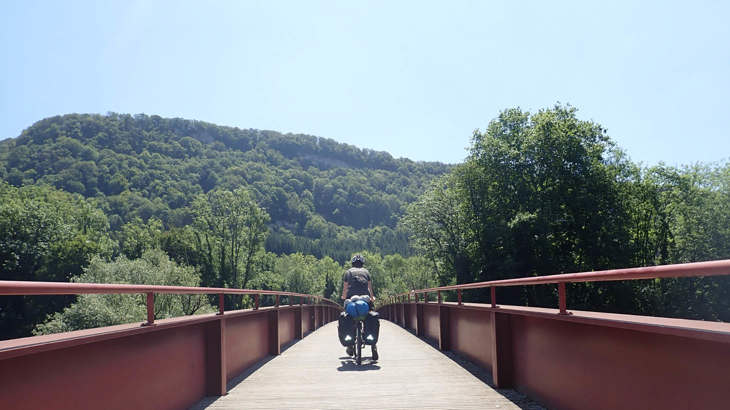Lilith Cooper (they/them) and Abi Melton (she/they) never saw themselves reflected in cycling narratives. So they wrote their book, Gears for Queers to celebrate some of the different ways to be a cyclist. Here they share their story and shout about some of the LGBTQ+ people paving the way for more inclusive cycling in the UK.

"Cycling had always been the way I’d felt strong, free and capable." - Lili
Feeling connected to the world you're riding through
Lili: Even though I grew up cycling, heading off for a long-distance cycle tour felt like a leap into the unknown, especially because I’m neurodivergent and had experienced significant mental health challenges.
But cycling had always been the way I’d felt strong, free and capable, so it made sense that if we were going to leave for an adventure, I’d have my bike to cling to.
The ups and downs of our first tour are recounted in our book Gears For Queers.
What I love about cycling is the empowering feeling of moving under your own steam and of feeling connected to the world you’re riding through.
Cycle touring shifted my relationship with my body
Abi: Like Lili, I’d cycled when I was a kid, but I stopped when I was a teenager, after a comment from a group of lads about my ‘fat arse’.
When we met and I moved to Cambridge, Lili encouraged me to start riding into work: I was terrified!
I refused to make right-hand turns, so Lili had to plot convoluted routes for me to get where I needed to go!
Cycle touring was Lili’s suggestion, and I liked the idea in theory.
I had no idea what a physical challenge it was going to be, but I learned so much about what I was capable of.
It also shifted my relationship with my body: when I left for the tour I was fat, 2000 kilometres later I was still fat!
I started learning about body positivity and fat liberation, and now I try to be the representation that I didn’t see when I was a teenager.

Lili and Abi wrote Gears for Queers because they didn’t see themselves reflected in cycling narratives.
Shifting the cycling narrative
Lili: That’s part of the reason we wrote Gears for Queers: because we didn’t see ourselves reflected in cycling narratives.
We wanted to write about some of the different ways to be a cyclist, and we wanted to see some proud queer rep on the shelves!
Abi: What’s important about Gears for Queers is that it isn’t a coming-out narrative, and (spoiler alert) no one dies at the end!
It’s about being queer and at the same time, it’s about learning to read maps, and fixing punctures, and the joy of riding.
It’s also a (sometimes painfully) honest depiction of our relationship as a couple.
It's hard to feel like I fit
Lili: I’m non-binary, which means I’m not a man or a woman.
I’m agender, but trans and non-binary are umbrella terms for a whole spectrum of genders.
Cycling is often divided into men/women. It’s hard to feel like I fit.
Often, non-binary people are tagged onto events for women without additional thought about what including us means.
When riding alone or in groups, I ask: how much of myself will I have to leave at home?
There’s the question of safety, which is even more present for other LGBTQ+ folk – especially trans women of colour.
If you’re cis and straight, it might not occur to you because ‘of course LGBTQ+ people are welcome here’, but it’s vital to be explicitly queer and trans positive.

"Cycling is often divided into men/women. Often, non-binary people are tagged onto events for women without additional thought about what including us means." - Lili
Carving out a space in cycling that's inclusive
Abi: We’re lucky to have found a community that has carved out a space in cycling that is radical, inclusive and fun.
The theme for Scotland’s LGBT history month was ‘Unsung’.
So we wanted to finish by sing-shouting about some LGBTQ+ led organisations and LGBTQ+ cyclists.
Trans-led Spokesperson in Wales was set up to address the ways that marginalised groups are disproportionately affected by the issues active travel campaigning sets out to address.
The Ipswich Bike Kitchen is another great DIY organisation offering affordable bike repairs and resources.
Touring led me to fat lib and to people like Marley Blonsky, a fat adventure cyclist in occupied Turtle Island (aka the US).
In the UK, Scottee & Friends, co-founded by artist and cyclist Scottee, are putting on a day of online fat activism on 4 March to disrupt ‘World Obesity Day’.

"We’re lucky to have found a community who have carved out a space in cycling that is radical, inclusive and fun." - Abi
Lili: There are too many people!
I admire Emily Chappell, the bike courier-turned-ultracyclist and author.
And Philipa York, the Scottish cyclist and journalist.
Sarah Stephenson-Hunter is a blind trans woman, a cyclist, and host of the Simply Equality Podcast, which talks about being disabled and LGBTQ+.
When we were touring, I noticed the impact of different infrastructure, something addressed by people like Tamika Butler, an urban planner and advocate.
Also, many of the contributors to Cyclista Zine.
Finally, the current Campus Cycling Officer at Transitions St. Andrews and aspiring ultra cyclist, Tamzin Dewar is co-organising Switching Gears – a festival of online events about inclusion and cycling.
It’s a great example of centring different voices in active travel, and we can’t wait to speak at it!
Buy a copy of Lili and Abi's book, Gears for Queers.
To find LGBT+ support services and community groups local to you, visit the Stonewall website.






